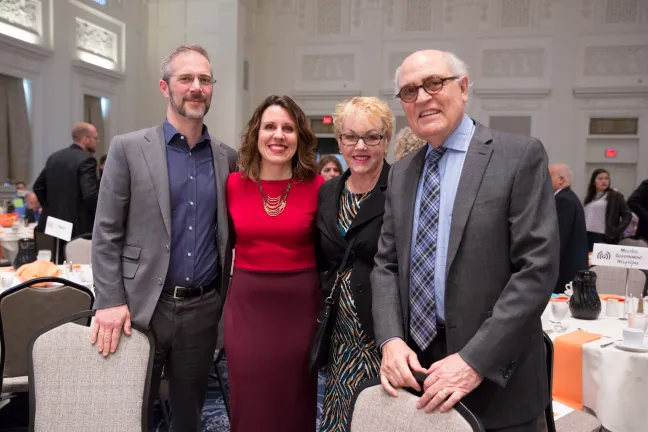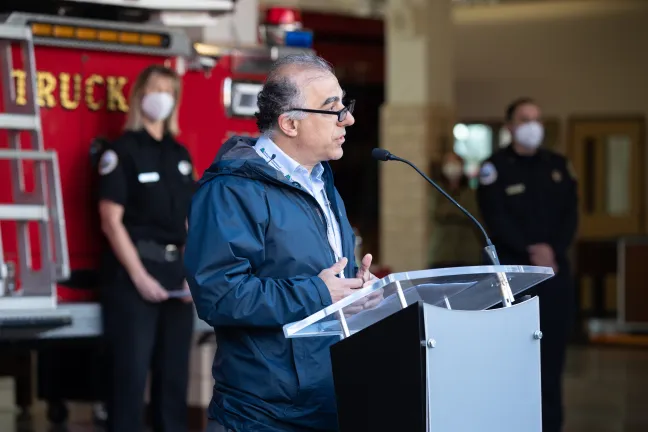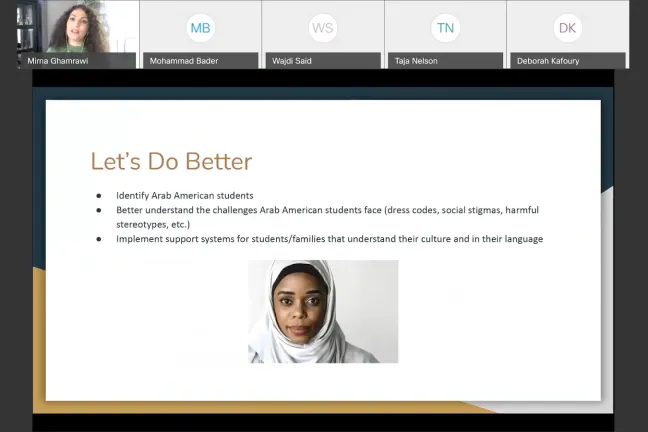The Multnomah County Board of Commissioners recognized — for the first time — April 2021 as Arab American Heritage Month.
The declaration approved Thursday, April 8, honors more than 3.5 million Arab Americans — including roughly 70,000 Oregonians.
Arab Americans have been making invaluable contributions to American civic life and society, across science, medicine, law, business, education, technology to government and culture, the proclamation read.
Arab Americans represent a broad collection of cultures and traditions and can trace roots to nearly two dozen countries across the Middle East and North Africa, said Multnomah County Chair Deborah Kafoury, who started the presentation.
Many Arab Americans are here after fleeing war, poverty and persecution.
“Over the decades, Arab Americans have taken part in, and contributed to, every part of American and civic life and have become a vibrant part of the American tapestry,” she said.
“As an Arab American myself, I’m feeling both grateful and proud that we have this item before the Board,” she said.
Kafoury’s great-grandfather, Nadar Kafoury, immigrated from Syria at just 15 years old.
“He became a citizen and built a business,” she said. “And here’s an American story for you — he was eventually elected the mayor of a small town in Idaho.”
“Arab Americans are our friends and neighbors and our colleagues and our loved ones,” Kafoury continued. “It’s also an opportunity to deepen our understanding of and connections to the joys and concerns and challenges that Arab Americans experience.”
She was joined by other community leaders in sharing their thoughts and reflecting on the meaning of the proclamation.
“This is deeply personal to me today,” she said. “And I’m really proud to be sharing this with all of you.”
Mohammad Bader, Department of County Human Services
Mohammad Bader, Interim director of the Department of County Human Services, began the event with a poem he wrote, reciting it in both Arabic and English.
The poem, “Ahmad the Arab,” was prefaced by the experiences of first- and second-generation Arab American immigrants seeking fortune, joy or escape from oppression, Bader said — particularly among the Iraqi and Syrian communities.
The full poem is below, but he read, in part:
Don’t ask about my name and my address,
For, the night and the stars are my brothers and sisters;
And the planets of the world are my companions,
And the will of God protects me.
I have lost my family and friends,
Wandering weary in this foreign land.
I have asked the night to hold me,
To hold me beneath its wings;
And the stars guided me to my eternal garden.
I am Ahmad, the Arab.
“I’m really proud to share this with all of you,” Kafoury said of Bader’s poem. “He is very talented not only as a leader for the community and County but also as a poet.”
Nadia Dahab, Arab American Cultural Center of Oregon
Nadia Dahab, president of the Board of Directors for the Arab American Cultural Center of Oregon (ACCO), shared the importance of the proclamation.
ACCO, a nonprofit cultural center dedicated to preservation and promotions of Oregon’s diverse Arab community, works statewide to elevate Arab American culture with programs and events. The center is planning its annual Arab festival Sunday, April 11, featuring poetry, artists and more.
The organization has been working hard to meet the needs of its community, particularly in 2020, noted Dahab. But the past several years have been challenging, as racist and hateful rhetoric nationally has been allowed to become mainstream and prominent, “We’ve experienced particularly challenging cultural and political times,” she said.
The nonprofit works to provide for and protect community members — identifying social services and partnerships, recently the Oregon Food Bank, to provide more access to resources for people in need.
“We also made sure, collectively with Multnomah County, to ensure Arab Americans are counted in the Census and registered and able to vote in our elections,’’ she said.
“Ultimately, our hope is that by promoting the culture and heritage of our Arab community members, we can build relationships within and among those members and allow our community to flourish. This resolution recognizing Arab American Heritage Month will further that work substantially.”
Mirna Ghamrawi, Portland Public Schools
Mirna Ghamrawi, a student success supervisor at Portland Public Schools, shared the school district’s efforts to implement support systems for students and their families, and emphasized the significance of the Board proclamation.
The district serves 124 students who identify as coming from homes where Arabic is spoken, she said. But there are many challenges in identifying an accurate number of students and families.
Some are English-language learners, but many are second-generation Arab Americans. Native English speakers are not enrolled as English language learners in the system, and therefore sometimes aren’t able to be counted.
Arab Americans are often lumped under Caucasian/White, she said, “which makes it difficult to count and identify needs.”
A recent survey of Arab American students regarding the COVID-19 pandemic found: acute needs for social and emotional support, followed by language access needs, among other challenges accessing and using learning technologies.
The issues span the grades, she said. “We are trying to do better. We can do better. But the biggest challenge we face is counting Arab American students.”
Portland Public Schools’ Board of Education declared April as Arab Heritage month in 2019. They hosted celebrations and projects throughout their schools. The district also hosted a parent academy to provide instruction on how to download school apps and check grades.
“We teach them about Multnomah County Library. We do all of that in their language,” she said. “We believe by educating parents we build communication and trust. They, in turn, can support their child’s education.”
Wajdi Said, Muslim Educational Trust
Wajdi Said was born in Yemen and came to the United States when he was 19 years old. Today, he is the executive director of the Muslim Educational Trust (MET).
“In my 34 years, I have seen a lot of positive changes and also a lot of challenges,” he said. “Most policymakers are unaware of the size and diversity and interests of the Arab community.”
He said Arab immigrants began coming to the United States in sizable numbers as early as the 1860s. Today, nearly 3.7 million Americans trace their roots to an Arab country. And Arab Americans are in every state, including Oregon, he said, where “the majority live in our great Multnomah County.”
While most Arab Americans have come to the United States by choice, the last 20 years has brought numerous Arab Americans seeking refuge due to foreign policies and global unrest.
Said recognized the local Arab Americans who’ve made tremendous contributions to the community, including representatives from Commissioner Lori Stegmann’s Office who helped conduct the recent Census.
Oregon Gov. Vic Atiyeh, who served from 1979 to 1987, worked to expand trade between east and west. “His work, recognized today, is why we are flourishing as Arab Americans in trade in East Asia, West Asian and North America.”
Said said Portland State University’s late founding dean, Nohad Toulan, put the school on the map by funding the College of Urban Planning.
And Said pointed to Chair Kafoury: “As an Arab American, with great Kafourys and many other Kafourys, we have healed and unified the civil rights movement here.”
In history, Arab Americans have been healers, he said, contributing to the framework of society and literature. Said noted many now contribute as workers at Intel or throughout the tech industry.
The challenge before us, he said, “Is how do we integrate by design.”
He said the creation of the Office of Immigrant and Refugees was important as a resource to “unify vulnerable communities.”
Since the COVID-19 pandemic started, the Muslim Educational Trust has worked to cover more than 6,000 families.
“We need healing and charismatic leaders and unifying policies.”
###
Full Poem by Mohammad Bader:
Ahmad The ArabDon’t ask about my name and my address,For, the night and the stars are my brothers and sisters;And the planets of the world are my companions,And the will of God protects me.I have lost my family and friends,Wandering weary in this foreign land.I have asked the night to hold me,To hold me beneath its wings;And the stars guided me to my eternal garden.I am Ahmad, the Arab.I am looking for a shade and a garden.I am searching for a home and an address.I am searching for a friend and a human,And I search for identify and citizenship;And I chase after a passportTo justify in it my humanity to those who oppress me;And I have taken fromThis foreign land,A SHELTER…To my children;To my beloved;And to myself;And I wandered far away;Stranger in a strange landBurying my pain and my sorrow;In this huge distanceDo not ask me about my name and my address.For the night is my house,and the stars are my lanterns;And back East I have a home,That calls me every morning.



